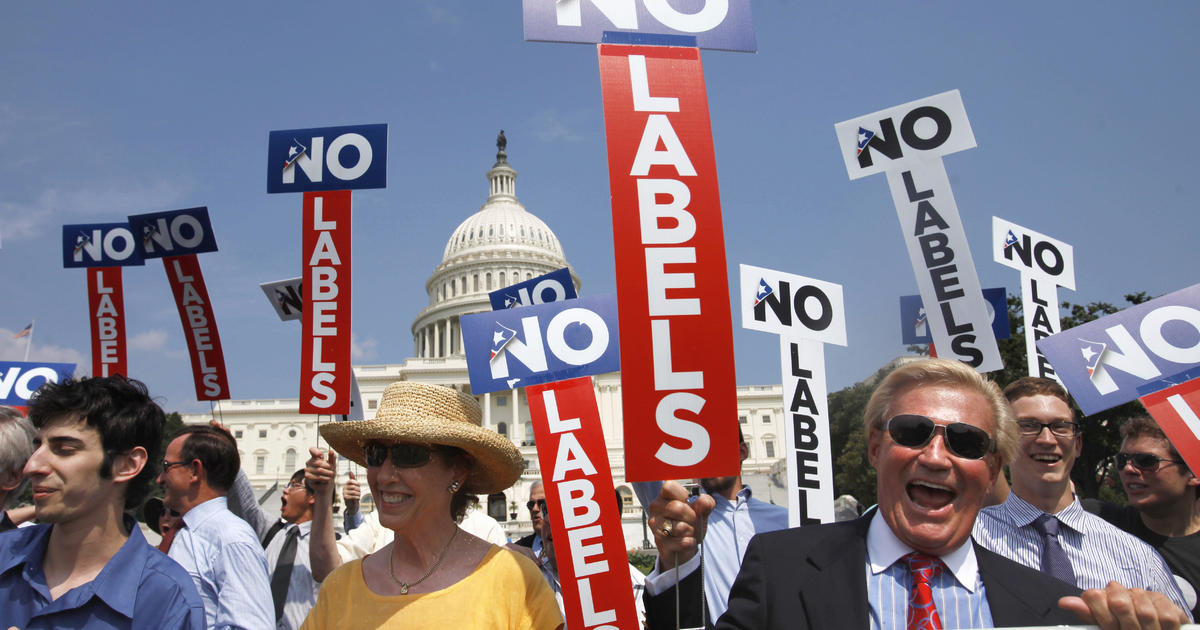
Is No Labels a social welfare organization or a political party? Why the organization may require a label.

For several months, the organization No Labels has been actively working to gain ballot access in numerous states for the 2024 presidential election. Their goal is to provide American voters with a more favorable option than the current potential candidates from the two main political parties: a repeat of the 2020 election between former President Donald Trump and President Joe Biden.
Despite securing a spot on the ballot in 14 states, there has been criticism surrounding No Labels’ intentions to field a candidate for the 2024 presidential election, as the organization is not a traditional political party.
What does No Labels mean?
No Labels was established in 2009 by Nancy Jacobson, spouse of Mark Penn, who served as Hillary Clinton’s top strategist during her Senate and initial presidential campaigns. It was formed as a 501(c)(4) group, meaning it is classified as a social welfare organization. According to the IRS, this type of organization is allowed to participate in political campaigns as long as it is not their primary focus. The original purpose of No Labels was to bring together members of both the Democratic and Republican parties in order to address and resolve some of the most challenging issues faced by Congress.
The election commission of the state stated.
William Galston, a co-founder of the group, stated to CBS News that he chose to separate from the movement when its focus changed and it began planning for a potential independent presidential campaign in 2024.
Galston stated that due to the significant impact of this matter, he could no longer continue in his prominent advisory role at No Labels with a clear conscience.
Two donors of No Labels were accused of claiming the group engaged in a “bait and switch” tactic.
The purported change in purpose has sparked a legal case in the Supreme Court of New York State. In January, two individuals from the Durst family, a prominent real estate family in New York City, sued the organization for a “bait and switch” by straying from their initial goal of promoting bipartisan legislation and potentially launching a third-party presidential campaign in 2024.
The legal complaint states that No Labels, a political organization, sought donations ten years ago by promoting a commitment to working together across party lines to find practical solutions that would resonate with the general population. This promise convinced Douglas and Jonathan Durst to contribute $145,000 to the cause. However, the Durst relatives now express remorse, citing No Labels’ deviation from its initial purpose and lack of accountability to its supporters.
There have been concerns about the financial practices of No Labels in the past few months, as the organization’s classification as a social welfare group exempts it from disclosing its sources of funding. In contrast, political parties are obligated to disclose the identities and amounts of their donors on a regular basis.
The organization has stated that it will handle this issue. During a media briefing in the previous year, Clancy stated that once a campaign is officially announced with a candidate, No Labels would be obligated to comply with all campaign finance regulations. Martini clarified that it is the presidential and vice presidential ticket, not No Labels, that would be affected by campaign finance laws. Furthermore, the ticket would be completely separate from the No Labels 501(c)(4) non-profit organization.
When is No Labels going to announce their nominee for the presidential election?
The No Labels organization is currently contemplating whether to move forward with its plan for a presidential unity ticket. According to Clancy, a decision should be made by mid-March.
No Labels has shared limited details about how they choose their candidates, but they have stated that they will have a virtual convention and reveal their chosen nominee afterwards. The organization has not specified who is qualified to run, but they have mentioned that their members will be responsible for the selection process.
According to Galston, the group presents itself as bipartisan, but the involvement of former Maryland Governor Larry Hogan with No Labels suggests a preference for a Republican candidate over a Democratic one. Hogan stepped down from the board of No Labels earlier this year and endorsed GOP nominee Nikki Haley for president. He recently declared on Friday…
He is campaigning for a seat in the Senate. .
When CBS News asked former independent Sen. Joseph Lieberman, the founding chairman of No Labels, about the possibility of Haley being chosen as the top candidate for a No Labels ticket, he praised her and said she should be seriously considered.
Clancy stated that if a ticket is submitted, all the necessary information on the selection process will be provided. The main priority is ensuring that the ticket is included on the ballot, as without that, any further discussion would be irrelevant.
Where has No Labels been approved to appear on the ballot?
So far, No Labels has succeeded in meeting the requirements for ballot placement in 14 states, including Alaska, Arizona, Arkansas, Colorado, Florida, Hawaii, Kansas, Maine, Mississippi, Nevada, North Carolina, Oregon, South Dakota, and Utah.
According to Clancy, No Labels is projected to secure ballot access in 32 states by qualifying as a “placeholder” for a candidate in certain states.
According to Martini, in about eighteen states, the candidate is responsible for meeting the qualifications for ballot access due to state regulations. This is either because the state requires a designated candidate or because it is easier for the candidate to gather the necessary paperwork than for organizations like No Labels to do so. For instance, in Massachusetts, while an organization like No Labels would need to collect 60,000 signatures, a candidate only needs 10,000.
Thirteen states, including Connecticut, Georgia, Illinois, Indiana, Iowa, Kentucky, New Hampshire, New Jersey, New York, Pennsylvania, Virginia, Washington, and West Virginia, have a requirement for candidates to be named.
More
Source: cbsnews.com